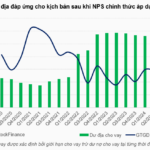At the 2nd Vietnam Logistics Conference in 2024, held on the morning of October 31st, Deputy Minister of Planning and Investment Do Thanh Trung emphasized: “Logistics is an essential service sector that plays a vital role and makes significant contributions to socio-economic development. Over the years, the Vietnamese government has introduced numerous policies to promote this important field, resulting in positive improvements in the capacity and ranking of Vietnam’s logistics sector.”
FACING NEW CHALLENGES
According to the World Bank’s (WB) Logistics Performance Index (LPI) ranking in 2023, Vietnam ranked 43rd, placing it among the top 5 countries in ASEAN.
Additionally, in the Agility Emerging Markets Logistics Index, which ranks emerging market logistics, Vietnam ranked 10th out of 50 emerging markets globally in 2023, moving up one place from the previous year.
The annual growth rate of Vietnam’s logistics sector averages 14%-15%, with a scale of 40-42 billion USD per year. The number of Vietnamese logistics enterprises has been growing rapidly, with over 3,000 domestic transport and logistics companies and about 25 leading global logistics groups currently operating in the country.

“The domestic logistics industry still faces several challenges that need to be addressed in key export areas for agricultural products such as the Mekong Delta. The system of seaports, especially deep-water ports, has not yet met the demand, forcing goods to be transported through major ports like Ho Chi Minh City and Ba Ria-Vung Tau, creating pressure on infrastructure and transportation costs.”
At the conference, Deputy Minister Do Thanh Trung shared that the transportation infrastructure, including roads, airports, seaports, warehouses, commercial infrastructure, and logistics centers, has been continuously expanded on a large scale in recent years. However, there are still some existing issues and limitations in Vietnam’s logistics sector.
First, policies and institutions related to the logistics industry are lacking and inconsistent, and a comprehensive legal framework for the industry is absent.
Second, transportation and logistics infrastructure, such as warehouses, yards, and logistics centers, are limited and not well-coordinated. Well-connected multimodal transport corridors have yet to be established, and strategic locations for logistics centers that connect to ports, airports, roads, and production facilities are lacking.
Third, Vietnamese logistics enterprises face limitations in terms of expertise, experience, capital, and human resources, resulting in weak competitiveness. They often act as subcontractors or agents for foreign corporations.
Fourth, there is a shortage of well-trained human resources in the field of logistics, particularly individuals with the skills to apply and implement new technologies within the enterprises.
Le Trong Minh, Editor-in-Chief of Dau Tu Newspaper, opined that for the path ahead of Vietnam’s logistics industry to be a “green path” as many hope, it cannot rely solely on existing potential and advantages.
“Even though the score has improved in the rankings, the 43rd position in the world for the ‘Logistics Performance Index’ also serves as a reminder that the Vietnamese logistics industry must not only progress but also break through in a rapidly changing world,” emphasized Minh.
DIGITAL TRANSFORMATION CREATES BREAKTHROUGH MOMENTUM
In his directive speech at the forum, Deputy Minister Do Thanh Trung recommended that logistics enterprises must improve their operations, promote digital transformation, and invest in applying new technologies to enhance their effectiveness and competitiveness to survive and thrive.
“These are not insignificant challenges for Vietnamese logistics enterprises, most of which are small and medium-sized businesses with limited experience, capital, and human resources. However, it also presents a significant opportunity to accelerate, strengthen, and substantiate the transformation process,” Mr. Trung emphasized.
Enterprises that better grasp the new waves of technology will surpass their competitors, and nations that effectively harness these technological advancements will outpace other countries.
Also, at the forum, from the perspective of a consulting unit, Mr. Yoshihiro Wake, Director of International Market Development of Abeam Consulting, shared that digital transformation is crucial for the logistics industry. Through the “twin” digitalization of Big Data and Artificial Intelligence (AI), it is possible to integrate and analyze industry data such as transport routes and modes of transport. This enables the monitoring of processes within the supply chain.
According to Mr. Dinh Thanh Son, Deputy General Director of Viettel Post, the first step in digital transformation is to transform people and human resources. Drawing from his practical experience in the company’s digital transformation journey, with over 40,000 employees, Mr. Son shared that they have started digitizing processes and operations. Simultaneously, they have invested in tools such as IoT (Internet of Things) and applications for their staff.
“Through this, the company collects data and begins analyzing it to create a management platform. The most important thing is that applying technology will help identify bottlenecks in the system, allowing for more rational redistribution and reinvestment of resources,” emphasized Son.
According to Precedence Research’s market outlook, the global logistics market size is projected to reach $21.91 trillion by 2033, with a compound annual growth rate of 9.35% from 2024 to 2033.
In Vietnam, the logistics market value reached approximately $40 billion in 2023 and is expected to continue growing at a rate of 14-15% annually until 2025. The logistics industry currently contributes about 4-5% to GDP and provides direct employment to over 1 million workers.
Unlocking the Pre-Funding Knot: A Jubilant Yet Cautionary Tale
The new circular addressing pre-funding obstacles takes effect immediately from November 2, 2024, marking a significant step forward in Vietnam’s stock market upgrade aspirations. While this move brings the market closer to its goal, it also presents a unique set of challenges that cannot be overlooked.
The Data Law: A Vital Enabler of the Digital Economy
In Vietnam’s accelerating digital transformation journey, the development and enactment of the Data Law is a crucial step towards establishing a robust legal framework for data governance and exploitation. The draft Data Law is currently under discussion, and if passed, it will have far-reaching implications for various sectors, especially national digital transformation, the digital economy, and digital society.





















